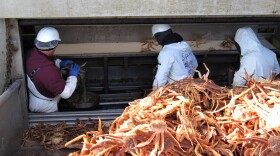The City of Unalaska passed a "hunker down" order that took effect at 12:01 Wednesday morning. The order reads that all non-critical businesses must close, and that Unalaskans should stay at home as much as possible due to the global coronavirus pandemic.
"Some businesses and entities serve critical roles that are necessary to combat this public health emergency or provide critical community functions and cannot be put on hold while we address the emergency," reads the city's order.
The list of critical businesses includes anything related to fishing, shipping, or groceries. It also includes educational institutions, and "essential infrastructure," like water, sewer, and gas.
Unalaska has an unemployment rate of around 2 percent, and when fishing is the largest industry in town, most people either work in it, or in jobs that support it. Alaska Department of Fish & Game? Still at work. The Grand Aleutian Hotel? Still open. The Harbor View Bar & Grill? Still open for takeout service, which means, people are still at work.
For perspective: There are about 250 longshoremen or support staff who are still eligible for work (though not all work consistently), and the Unalaska City School District employs 64 people. Those two groups account for ten percent of the working population alone, according to information from Data USA. Though even among exempt workers, some have chosen to change their schedule.
School Superintendent John Conwell said all employees have been given the option of working at home, working at school, or working a combination of each location. Maintenance and custodial staff are working in the buildings, but on staggered shifts.
"Today, for example, approximately 50% of the teaching faculty were working in their classrooms and the others have chosen to come into the school later in the evening or early in the morning to make lesson plans and organize their resource materials," said Conwell. "This is all in an effort to de-densify the number of people in the buildings at any one time and to promote social distancing."
In Anchorage, most school staff (including teachers) have been telecommuting and working from home for the past week. As of Friday afternoon, Anchorage had 33 confirmed cases of coronavirus.
Conwell said that, here in Unalaska, school district custodians "are continuing to clean/sanitize/disinfect during each shift."
Coronavirus can remain on surfaces for up to three days, and linger in the air for hours after someone infected has coughed or sneezed, according to a joint study from the National Institutes of Health, the Centers for Disease Control and Prevention (CDC), and Princeton University.
"I don't have data or evidence to show [whether staying at home or going to work and staggering shifts] is more effective," said Dr. Gabriel Garcia, an Associate Professor of Public Health at University of Alaska Anchorage. But in his opinion, staying at home is much more preferable. "While there may be fewer people working with staggered work shifts, the workers are still at risk of having them infect each other."
So who has been affected by the "hunker down" order?
KUCB has confirmed that the Qawalangin Tribe is working with less staff. The Unalaska Visitors Bureau is closed. Many non-essential city employees are working from home. The Ounalashka Corporation, which is an "essential" service, is also working with reduced staff. And at KUCB, which also qualifies as "essential," staff alternate days in the studio, and the building is closed to the public.
On Friday, Gov. Mike Dunleavy passed two more state health mandatesfollowing Alaska’s first in-state death from the coronavirus: that non-essential workers "are mandated to stay at their place of residence and practice social distancing," and that all in-state travel "is prohibited unless travel is to support critical infrastructure; or for critical personal needs."
State health mandates override any local orders. Though in this case, it appears that Unalaska's hunker down order is still in line with the mandate rules.
If your business has been affected by the hunker down order or the governor's health mandates, we'd love to hear from you. Please email news@kucb.org.






